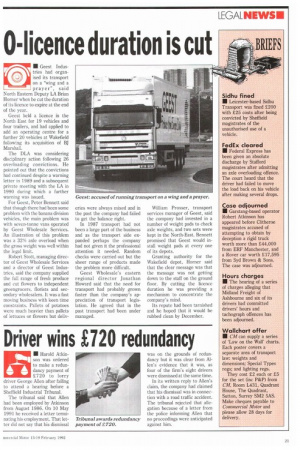0-licence duration is cut
Page 23

If you've noticed an error in this article please click here to report it so we can fix it.
• Geest Industries had organised its transport on a "wing and a prayer", said North Eastern Deputy LA Brian Homer when he cut the duration of its licence to expire at the end of the year.
Geest held a licence in the North East for 19 vehicles and four trailers, and had applied to add an operating centre for a further 20 vehicles at Wakefield following its acquisition of BJ Marshall.
The DLA was considering disciplinary action following 26 overloading convictions. He pointed out that the convictions had continued despite a warning letter in 1989 and a subsequent private meeting with the LA in 1990 during which a further warning was issued.
For Geest, Peter Bennett said that though there had been some problem with the banana division vehicles, the main problem was with seven-tonne vans operated by Geest Wholesale Services. An illustration of this problem was a 32% axle overload when the gross weight was well within the legal limit.
Robert Stott, managing director of Geest Wholesale Services and a director of Geest Industries, said the company supplied the full range of fresh produce and cut flowers to independent greengrocers, florists and secondary wholesalers. It was a fast moving business with keen time constraints. Pallets of potatoes were much heavier than pallets of lettuces or flowers but deliv eries were always mixed and in the past the company had failed to get the balance right.
In 1987 transport had not been a large part of the business and as the transport side expanded perhaps the company had not given it the professional attention it needed. Random checks were carried out but the sheer range of products made the problem more difficult.
Geest Wholesale's eastern regional director Jonathan Howard said that the need for transport had probably grown faster than the company's appreciation of transport legislation. He agreed that in the past transport had been under managed.
William Prosser, transport services manager of Geest, said the company had invested in a number of weight pads to check axle weights, and two sets were kept in the North-East. Bennett promised that Geest would install weight pads at every one of its depots.
Granting authority for the Wakefield depot, Horner said that the clear message was that the message was not getting down to the staff on the ground floor. By cutting the licence duration he was providing a mechanism to concentrate the company's mind. Its repute had been tarnished and he hoped that it would be rubbed clean by December.




















































































